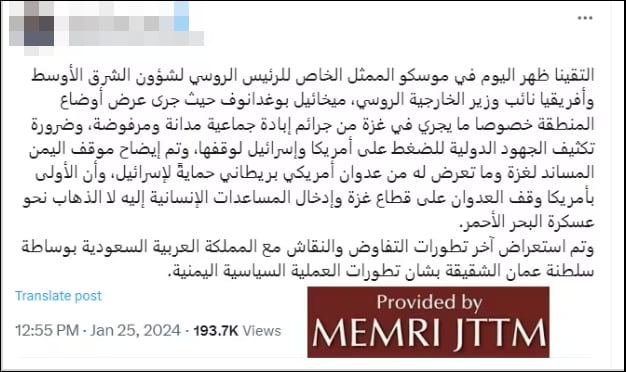The following report is now a complimentary offering from MEMRI's Jihad and Terrorism Threat Monitor (JTTM). For JTTM subscription information, click here.
On January 25, 2024, Muhammad Abdulsalam, the spokesman for Iran-backed Yemen's Ansar Allah movement (Houthis), wrote on his account on X (formerly Twitter) that he met in Moscow with Russian Deputy Foreign Minister Mikhail L. Bogdanov, the Special Representative of the President of the Russian Federation for the Middle East and African countries, to discuss the unfolding developments in the Middle East.[1]
"America Should Stop Aggression, Not Militarize Red Sea"
Abdulsalam wrote that the discussion centered around the situation in the Gaza Strip and the "genocidal crimes" taking place there, stressing the need for the international community to "multiply efforts" to pressure the U.S. and Israel to stop the "genocide" in Gaza.
Abdulsalam stated that the discussion with Bogdanov included Yemen's position in support of the Palestinians in Gaza, as well as its opposition to the "American-British aggression" waged against Yemen to protect Israel.
He wrote: "America should stop the aggression against the Gaza Strip and facilitate the entry of humanitarian aid into the enclave, rather than militarize the Red Sea."
Additionally, the Russian and Houthi officials discussed the latest developments of the Oman-mediated talks between Yemen's Houthis and Saudi Arabia concerning Yemeni politics.

Russia's Foreign Affairs Ministry's Press Release
The Russian Ministry of Foreign Affairs stated, in a media release, that the men held an in-depth discussion of a comprehensive settlement of the prolonged military-political crisis in Yemen. The statement also stressed the importance of increasing the international efforts to quickly create the necessary conditions for establishing a comprehensive intra-Yemeni national dialogue under the auspices of the UN.
According to the press release, special attention was paid to the situation in the Red Sea. Military actions by the U.S. and the British against Yemen could destabilize the situation on a regional scale, the statement noted, and these acts were "strongly condemned."[2]
Series Of Meetings: Moscow's Strategy And Houthis' Yemen Policy
The Bogdabnov-Abdulsalam meeting is one of a series of prior encounters between the Houthis and Russian officials. The encounters began in March 2015, after the Houthis seized Sana'a in late 2014. These meetings are a part of Moscow's strategy of engagement with Iran-backed groups as Russia seeks to project its power in the Middle East.
On July 24, 2019, Bogdanov received a Houthi delegation in Moscow headed by Abdulsalam. At the meeting, Bogdanov presented the Kremlin's Collective Security Concept for the Persian Gulf Region, a Russian proposal which "envisions creating an initiative group to set up an international conference for security and cooperation in the Persian Gulf region, which will later make it possible to create a permanent organization."[3]
The Kremlin has long maintained friendly contacts with the Houthis, as well as with other players in the Yemeni arena, while deepening its influence in the Gulf of Aden and in the Bab Al-Mandab Strait. A strengthened Russia-Houthis association presents strategic risks to U.S. interests: Entrenched Russian influence in Yemen could position Russia as a greater force in the area, or provide a Russian base on the strategic waterways in the future.[4]

Mikhail Bogdanov during his meeting in Moscow with the delegation of the Houthis (July 24, 2019).[5]
Just a week ago, on January 19, 2024, Russia's Deputy Foreign Minister Bogdanov received a Hamas delegation, led by the group's international relations chief, Moussa Abu Marzouq. The Hamas visit to Moscow is the second since Hamas's October 7 attack on Israel.[6]
[1] Twitter, January 25, 2024.
[2] January 25, 2024.
[3] Yemen News Agency, July 24, 2019.
[4] See MEMRI JTTM Report: Russia's Wartime Ties To Iran-Backed Designated Terrorist Groups Threaten Regional Security, U.S. Interests In Middle East, June 9, 2023.
[5] Yemen News Agency, July 24, 2019.
[6] See MEMRI JTTM Report: Hamas Delegation Visits Moscow In Second Meeting With Russian Deputy Foreign Minister Since October 7, January 19, 2024.
The full text of this post is available to subscribers.
Please login or register to request subscription information from MEMRI



